双语美文1-所谓情商高就是相互理解
- 格式:doc
- 大小:28.00 KB
- 文档页数:1
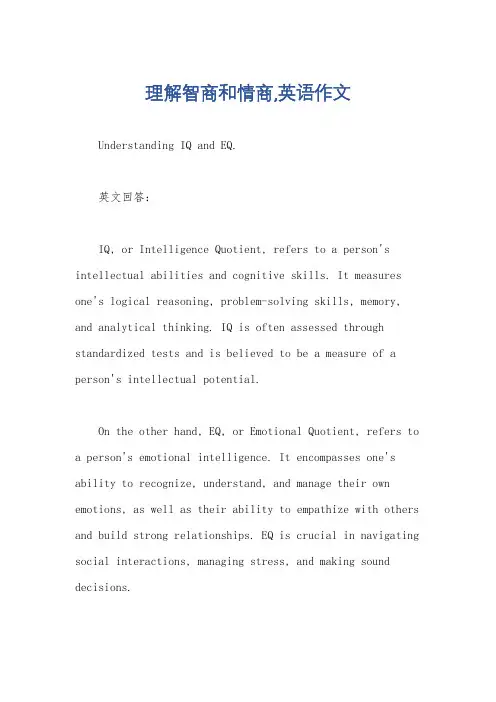
理解智商和情商,英语作文Understanding IQ and EQ.英文回答:IQ, or Intelligence Quotient, refers to a person's intellectual abilities and cognitive skills. It measures one's logical reasoning, problem-solving skills, memory, and analytical thinking. IQ is often assessed through standardized tests and is believed to be a measure of a person's intellectual potential.On the other hand, EQ, or Emotional Quotient, refers to a person's emotional intelligence. It encompasses one's ability to recognize, understand, and manage their own emotions, as well as their ability to empathize with others and build strong relationships. EQ is crucial in navigating social interactions, managing stress, and making sound decisions.While IQ and EQ are both important, they represent different aspects of human intelligence. IQ focuses on cognitive abilities, while EQ emphasizes emotional awareness and interpersonal skills. It is possible for someone to have a high IQ but a low EQ, or vice versa.For example, let's consider two individuals. John has a high IQ and excels in academic subjects. He is able tosolve complex mathematical problems and has a sharp memory. However, John struggles to understand and manage his own emotions. He often becomes overwhelmed by stress and findsit challenging to relate to others.On the other hand, Sarah has an average IQ but a high EQ. She may not excel academically, but she has excellent interpersonal skills. Sarah is empathetic, a good listener, and is able to build strong relationships. She is also skilled at managing her own emotions and coping with stress.In this example, John represents someone with a high IQ but a low EQ, while Sarah represents someone with anaverage IQ but a high EQ. It is evident that both IQ and EQplay important roles in a person's overall intelligence and success in life.中文回答:智商(IQ)指的是一个人的智力能力和认知技能。
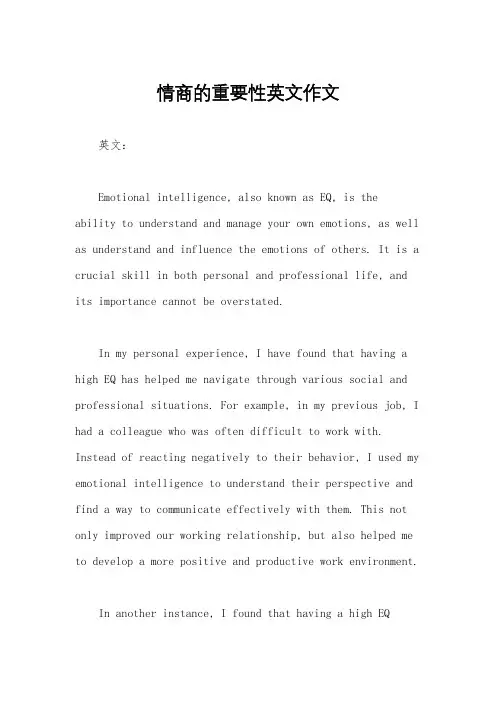
情商的重要性英文作文英文:Emotional intelligence, also known as EQ, is theability to understand and manage your own emotions, as well as understand and influence the emotions of others. It is a crucial skill in both personal and professional life, and its importance cannot be overstated.In my personal experience, I have found that having a high EQ has helped me navigate through various social and professional situations. For example, in my previous job, I had a colleague who was often difficult to work with. Instead of reacting negatively to their behavior, I used my emotional intelligence to understand their perspective and find a way to communicate effectively with them. This not only improved our working relationship, but also helped me to develop a more positive and productive work environment.In another instance, I found that having a high EQhelped me in my personal relationships as well. When dealing with conflicts or misunderstandings with friends or family, I was able to approach these situations with empathy and understanding, which ultimately led to better resolutions and stronger relationships.In the professional world, emotional intelligence is highly valued by employers. People with high EQ are often better at working in teams, resolving conflicts, and communicating effectively. This is because they are able to understand and manage their own emotions, as well as recognize and respond to the emotions of others. This not only leads to better teamwork and collaboration, but also to improved leadership and decision-making skills.中文:情商,也称为情绪智商,是理解和管理自己情绪的能力,也包括理解和影响他人情绪的能力。
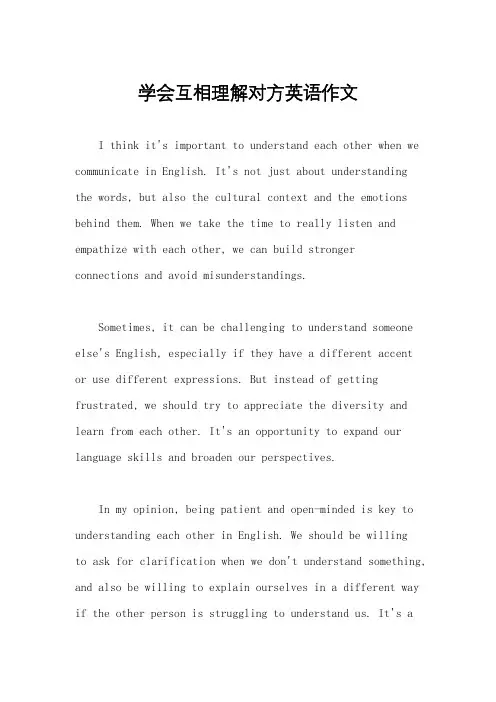
学会互相理解对方英语作文I think it's important to understand each other when we communicate in English. It's not just about understanding the words, but also the cultural context and the emotions behind them. When we take the time to really listen and empathize with each other, we can build strongerconnections and avoid misunderstandings.Sometimes, it can be challenging to understand someone else's English, especially if they have a different accentor use different expressions. But instead of getting frustrated, we should try to appreciate the diversity and learn from each other. It's an opportunity to expand our language skills and broaden our perspectives.In my opinion, being patient and open-minded is key to understanding each other in English. We should be willingto ask for clarification when we don't understand something, and also be willing to explain ourselves in a different way if the other person is struggling to understand us. It's atwo-way street, and both parties need to make an effort to bridge the communication gap.I believe that practicing active listening is crucial for understanding each other in English. This means giving the speaker your full attention, asking questions to clarify anything you're unsure about, and providing feedback to show that you're engaged in the conversation. When we actively listen to each other, we can pick up on subtle cues and understand the underlying message beyond just the words being spoken.In my experience, using non-verbal communication can also help us understand each other in English. This includes gestures, facial expressions, and body language, which can convey a lot of meaning in addition to the words we use. By paying attention to these non-verbal cues, we can enhance our understanding and create a more holistic form of communication.Overall, I think that understanding each other in English is about more than just language proficiency. It'sabout empathy, patience, active listening, and non-verbal communication. When we approach communication with these principles in mind, we can truly connect with each other and build meaningful relationships.。
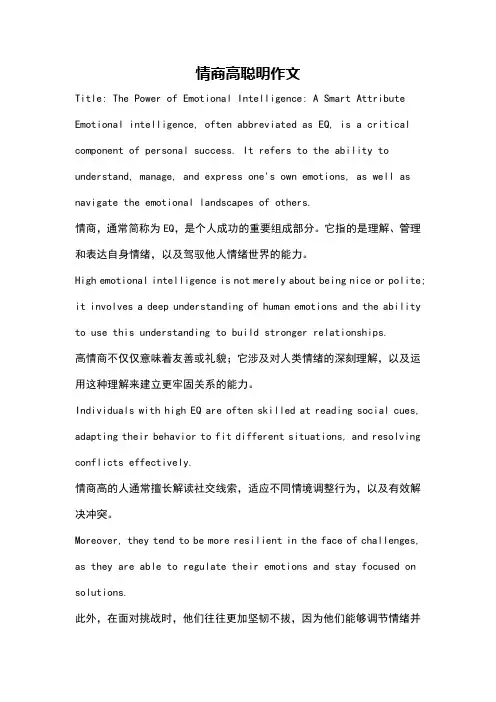
情商高聪明作文Title: The Power of Emotional Intelligence: A Smart Attribute Emotional intelligence, often abbreviated as EQ, is a critical component of personal success. It refers to the ability to understand, manage, and express one's own emotions, as well as navigate the emotional landscapes of others.情商,通常简称为EQ,是个人成功的重要组成部分。
它指的是理解、管理和表达自身情绪,以及驾驭他人情绪世界的能力。
High emotional intelligence is not merely about being nice or polite; it involves a deep understanding of human emotions and the ability to use this understanding to build stronger relationships.高情商不仅仅意味着友善或礼貌;它涉及对人类情绪的深刻理解,以及运用这种理解来建立更牢固关系的能力。
Individuals with high EQ are often skilled at reading social cues, adapting their behavior to fit different situations, and resolving conflicts effectively.情商高的人通常擅长解读社交线索,适应不同情境调整行为,以及有效解决冲突。
Moreover, they tend to be more resilient in the face of challenges, as they are able to regulate their emotions and stay focused on solutions.此外,在面对挑战时,他们往往更加坚韧不拔,因为他们能够调节情绪并专注于解决问题。
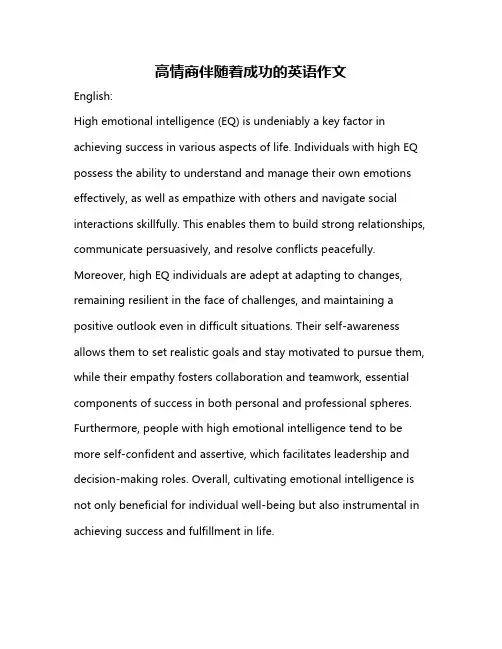
高情商伴随着成功的英语作文English:High emotional intelligence (EQ) is undeniably a key factor in achieving success in various aspects of life. Individuals with high EQ possess the ability to understand and manage their own emotions effectively, as well as empathize with others and navigate social interactions skillfully. This enables them to build strong relationships, communicate persuasively, and resolve conflicts peacefully. Moreover, high EQ individuals are adept at adapting to changes, remaining resilient in the face of challenges, and maintaining a positive outlook even in difficult situations. Their self-awareness allows them to set realistic goals and stay motivated to pursue them, while their empathy fosters collaboration and teamwork, essential components of success in both personal and professional spheres. Furthermore, people with high emotional intelligence tend to be more self-confident and assertive, which facilitates leadership and decision-making roles. Overall, cultivating emotional intelligence is not only beneficial for individual well-being but also instrumental in achieving success and fulfillment in life.中文翻译:高情商(EQ)无疑是在生活的各个方面取得成功的关键因素之一。
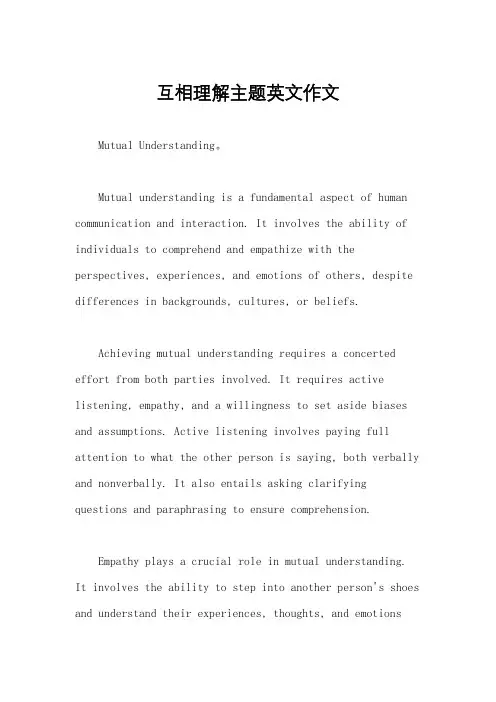
互相理解主题英文作文Mutual Understanding。
Mutual understanding is a fundamental aspect of human communication and interaction. It involves the ability of individuals to comprehend and empathize with the perspectives, experiences, and emotions of others, despite differences in backgrounds, cultures, or beliefs.Achieving mutual understanding requires a concerted effort from both parties involved. It requires active listening, empathy, and a willingness to set aside biases and assumptions. Active listening involves paying full attention to what the other person is saying, both verbally and nonverbally. It also entails asking clarifying questions and paraphrasing to ensure comprehension.Empathy plays a crucial role in mutual understanding.It involves the ability to step into another person's shoes and understand their experiences, thoughts, and emotionsfrom their own perspective. By practicing empathy, individuals can develop a deeper understanding of the motivations and behaviors of others, even if they do not necessarily agree with them.Furthermore, mutual understanding necessitates a willingness to challenge and examine one's own biases and assumptions. It requires recognizing that one's own perspective is not the only valid one and being open to considering alternative viewpoints. By questioning and critiquing one's own beliefs, individuals can foster a more inclusive and understanding mindset.Mutual understanding is essential for fostering harmonious relationships, promoting cooperation, and resolving conflicts. In personal relationships, it allows individuals to build strong bonds based on trust, respect, and empathy. In professional settings, it facilitates effective teamwork, collaboration, and problem-solving.中文回答:相互理解。
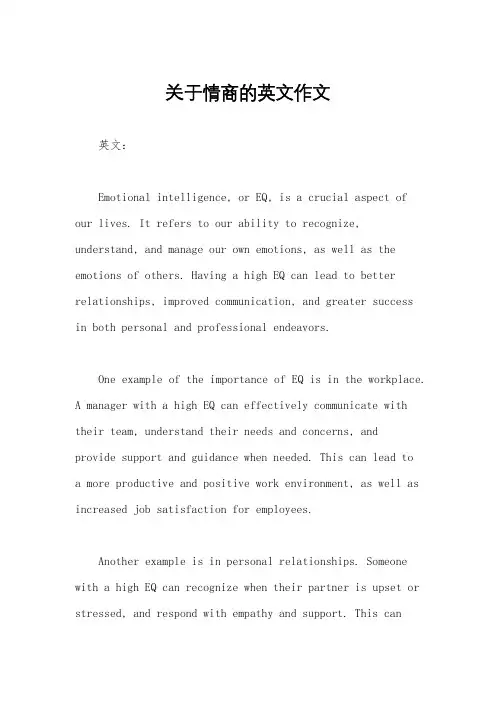
关于情商的英文作文英文:Emotional intelligence, or EQ, is a crucial aspect of our lives. It refers to our ability to recognize, understand, and manage our own emotions, as well as the emotions of others. Having a high EQ can lead to better relationships, improved communication, and greater successin both personal and professional endeavors.One example of the importance of EQ is in the workplace.A manager with a high EQ can effectively communicate with their team, understand their needs and concerns, andprovide support and guidance when needed. This can lead toa more productive and positive work environment, as well as increased job satisfaction for employees.Another example is in personal relationships. Someone with a high EQ can recognize when their partner is upset or stressed, and respond with empathy and support. This canlead to a stronger and more fulfilling relationship, as well as improved communication and conflict resolution skills.In contrast, someone with a low EQ may struggle to understand their own emotions or the emotions of others. This can lead to misunderstandings, conflicts, and damaged relationships.Overall, developing emotional intelligence is an important part of personal growth and can lead to a happier and more successful life.中文:情商,或称情绪智商,是我们生活中至关重要的一部分。
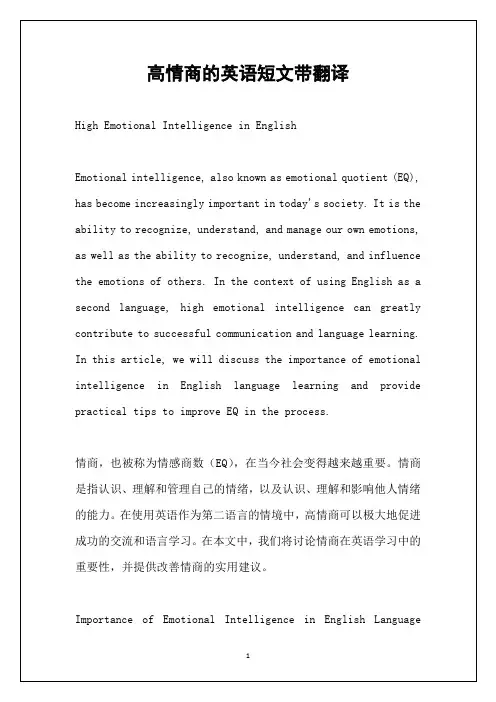
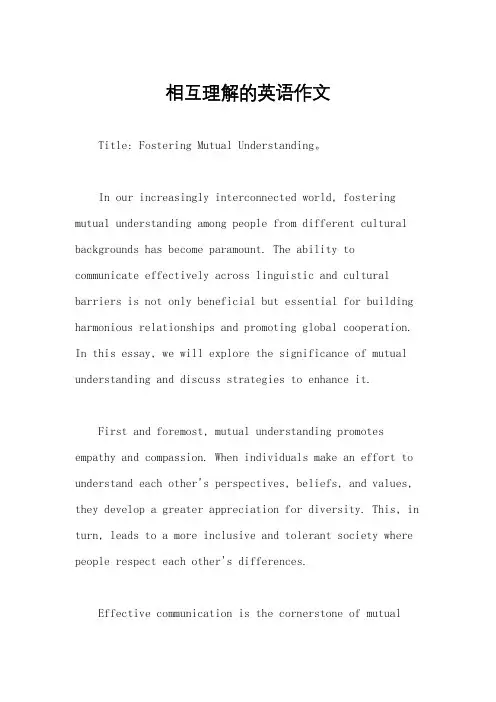
相互理解的英语作文Title: Fostering Mutual Understanding。
In our increasingly interconnected world, fostering mutual understanding among people from different cultural backgrounds has become paramount. The ability to communicate effectively across linguistic and cultural barriers is not only beneficial but essential for building harmonious relationships and promoting global cooperation. In this essay, we will explore the significance of mutual understanding and discuss strategies to enhance it.First and foremost, mutual understanding promotes empathy and compassion. When individuals make an effort to understand each other's perspectives, beliefs, and values, they develop a greater appreciation for diversity. This, in turn, leads to a more inclusive and tolerant society where people respect each other's differences.Effective communication is the cornerstone of mutualunderstanding. Language barriers often hinder communication, but with patience and openness, these barriers can be overcome. Language learning not only facilitates communication but also demonstrates respect for the other person's culture and language. Additionally, using simple and clear language, employing non-verbal cues, and actively listening are essential skills for bridging communication gaps.Cultural sensitivity is another crucial aspect of fostering mutual understanding. Each culture has its own norms, traditions, and taboos, and being aware of and respecting these differences is essential for meaningful interactions. It's important to approach culturaldifferences with curiosity rather than judgment, seeking to learn and understand rather than impose one's own beliefsor values.Moreover, exposure to different cultures through travel, literature, music, and cuisine can broaden one'sperspective and deepen appreciation for diversity. Engaging in cultural exchange programs, attending multiculturalevents, and participating in intercultural dialoguesprovide opportunities for individuals to learn from each other and break down stereotypes.Furthermore, promoting education and awareness about cultural diversity in schools, workplaces, and communitiesis crucial for nurturing mutual understanding.Intercultural education curriculum, diversity training programs, and cultural competency workshops can help individuals develop the skills and knowledge needed to navigate diverse environments respectfully and effectively.Building relationships based on trust and mutualrespect is fundamental to fostering mutual understanding.By treating others with kindness, empathy, and dignity, we create an environment where people feel valued and understood. Establishing platforms for open dialogue and collaboration allows individuals to share their experiences, perspectives, and concerns, fostering empathy andsolidarity.In conclusion, mutual understanding is essential forpromoting harmony, tolerance, and cooperation in our diverse world. By prioritizing effective communication, cultural sensitivity, education, and relationship-building, we can bridge divides and build a more inclusive and empathetic society. It's through our collective efforts to understand and appreciate each other's differences that we can truly thrive as a global community.。
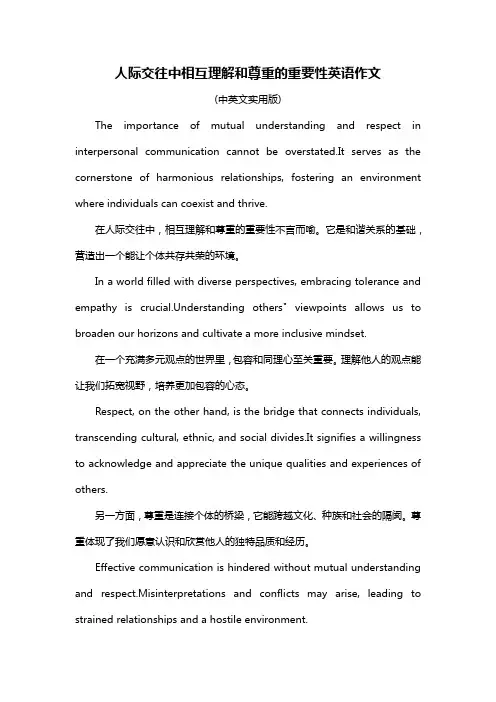
人际交往中相互理解和尊重的重要性英语作文(中英文实用版)The importance of mutual understanding and respect in interpersonal communication cannot be overstated.It serves as the cornerstone of harmonious relationships, fostering an environment where individuals can coexist and thrive.在人际交往中,相互理解和尊重的重要性不言而喻。
它是和谐关系的基础,营造出一个能让个体共存共荣的环境。
In a world filled with diverse perspectives, embracing tolerance and empathy is crucial.Understanding others" viewpoints allows us to broaden our horizons and cultivate a more inclusive mindset.在一个充满多元观点的世界里,包容和同理心至关重要。
理解他人的观点能让我们拓宽视野,培养更加包容的心态。
Respect, on the other hand, is the bridge that connects individuals, transcending cultural, ethnic, and social divides.It signifies a willingness to acknowledge and appreciate the unique qualities and experiences of others.另一方面,尊重是连接个体的桥梁,它能跨越文化、种族和社会的隔阂。
尊重体现了我们愿意认识和欣赏他人的独特品质和经历。
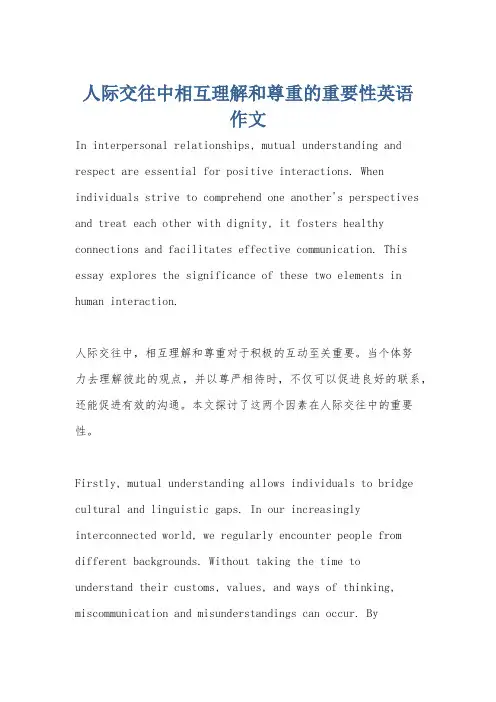
人际交往中相互理解和尊重的重要性英语作文In interpersonal relationships, mutual understanding and respect are essential for positive interactions. When individuals strive to comprehend one another's perspectives and treat each other with dignity, it fosters healthy connections and facilitates effective communication. This essay explores the significance of these two elements in human interaction.人际交往中,相互理解和尊重对于积极的互动至关重要。
当个体努力去理解彼此的观点,并以尊严相待时,不仅可以促进良好的联系,还能促进有效的沟通。
本文探讨了这两个因素在人际交往中的重要性。
Firstly, mutual understanding allows individuals to bridge cultural and linguistic gaps. In our increasingly interconnected world, we regularly encounter people from different backgrounds. Without taking the time tounderstand their customs, values, and ways of thinking, miscommunication and misunderstandings can occur. Byactively seeking to understand others' perspectives, we create an environment of empathy and openness that fosters harmonious relationships.相互理解可以帮助个体弥合文化和语言差距。
关于情商的文章英语作文Emotional intelligence, often referred to as EQ, is the ability to understand and manage your own emotions, as well as the emotions of others. It plays a crucial role in our everyday lives, affecting our relationships, decision-making, and overall well-being. In this essay, we will explore the importance of emotional intelligence and how it can be developed and improved.First and foremost, emotional intelligence is essential for building healthy and strong relationships. People with high EQ are able to empathize with others, communicate effectively, and resolve conflicts in a constructive manner. They are also better at understanding and managing theirown emotions, which helps them to stay calm and rational in challenging situations. As a result, they are more likelyto build trust and rapport with others, leading to more fulfilling and meaningful relationships.Moreover, emotional intelligence is critical for makingsound decisions. When we are able to recognize and understand our emotions, we are better equipped to make decisions that align with our values and goals. By being aware of our emotions and how they influence our thoughts and behaviors, we can avoid making impulsive or irrational decisions. This can lead to better outcomes in both our personal and professional lives.In addition, emotional intelligence is key to our overall well-being. Research has shown that people with high EQ are more resilient to stress, have better mental health, and are more satisfied with their lives. By developing our emotional intelligence, we can improve our ability to cope with challenges, regulate our emotions, and maintain a positive outlook on life. This can have a profound impact on our physical and mental health, as well as our overall happiness and satisfaction.So how can we develop and improve our emotional intelligence? One way is through self-awareness, which involves recognizing and understanding our own emotions. This can be done through self-reflection, mindfulnesspractices, and seeking feedback from others. By becoming more aware of our emotions, we can better understand how they affect our thoughts, behaviors, and relationships.Another way to improve emotional intelligence is through empathy, which involves understanding and sharing the feelings of others. This can be achieved through active listening, putting yourself in someone else's shoes, and showing compassion and understanding. By developing our empathy skills, we can build stronger connections with others, resolve conflicts more effectively, and cultivate a more inclusive and supportive environment.In conclusion, emotional intelligence is a vital skill that can have a profound impact on our relationships, decision-making, and overall well-being. By developing and improving our emotional intelligence, we can buildhealthier and more fulfilling relationships, make better decisions, and enhance our overall quality of life. It is never too late to work on our emotional intelligence, and the benefits are well worth the effort.。
智商与情商英文作文英文:Intelligence quotient (IQ) and emotional quotient (EQ) are two different types of intelligence that are importantin our daily lives. IQ refers to our cognitive abilities, such as problem-solving, logical reasoning, and analytical skills. EQ, on the other hand, refers to our emotional intelligence, including our ability to understand and manage our own emotions, as well as our ability to empathize with others and build strong relationships.While both types of intelligence are important, EQ is often considered more important in terms of success in life. This is because EQ is closely linked to our ability to communicate effectively, build relationships, and work well with others. For example, a person with high EQ may be able to diffuse a tense situation at work by using their emotional intelligence to understand the emotions of others and respond appropriately.In contrast, a person with high IQ but low EQ may struggle in social situations and have difficulty building relationships. They may be highly intelligent and capablein their field of work, but if they are unable to communicate effectively or work well with others, their success may be limited.In my personal experience, I have seen the importanceof EQ in my own life. I have a friend who is extremely intelligent and has a high IQ, but struggles with social interactions and building relationships. While they are successful in their career, their personal life is often filled with tension and conflict due to their lack of emotional intelligence.中文:智商(IQ)和情商(EQ)是我们日常生活中两种不同类型的智力。
情商的重要性英文作文英文:Emotional intelligence, also known as EQ (emotional quotient), is the ability to understand and manage your own emotions, as well as to understand and influence the emotions of others. It is a crucial skill in both personal and professional life, and its importance cannot be overstated.In personal relationships, having a high EQ allows individuals to communicate effectively, resolve conflicts, and build strong connections with others. For example, my friend Sarah has always been able to empathize with others and understand their feelings. This has made her a great friend to many people, and she has been able to maintain long-lasting and meaningful relationships. On the other hand, I have another friend who struggles with understanding and managing her emotions. This has led to misunderstandings and conflicts in her relationships, andshe often finds herself feeling isolated and lonely.In the professional world, emotional intelligence is equally important. People with high EQ are often better leaders, as they can understand and motivate their team members. They are also more adept at handling workplace conflicts and building strong, collaborative teams. For instance, my former boss was always able to remain calm and composed, even in high-pressure situations. This not only helped her to make sound decisions, but it also created a positive and productive work environment for everyone on the team.In contrast, I once had a colleague who lacked emotional intelligence. He often reacted impulsively andlet his emotions get the best of him, which led to tension and discord within our team. As a result, our team's performance suffered, and we struggled to meet our goals.In my own life, I have seen the impact of emotional intelligence firsthand. When I was able to understand and manage my own emotions, I found that I was better equippedto handle difficult situations and build stronger relationships. I also noticed that people were more responsive to me when I showed empathy and understanding towards their emotions.In conclusion, emotional intelligence is undeniably important in both personal and professional settings. It can make the difference between successful and unsuccessful relationships, as well as effective and ineffective leadership. Developing and honing this skill is essential for anyone who wants to thrive in today's interconnected world.中文:情商,也被称为情商(Emotional Quotient),是指理解和管理自己的情绪,以及理解和影响他人情绪的能力。
提高大学生情商的重要性的英语作文The importance of improving emotional intelligence for college students cannot be overstated. Emotional intelligence, also known as EQ, is the ability to understand and manage one's own emotions, as well as the ability to understand and influence the emotions of others. It is a crucial skill for success in both personal and professional life. In the following essay, I will discuss the significance of developing emotional intelligence in college students and provide some strategies for doing so.First and foremost, improving emotional intelligence can lead to better mental health and well-being. College students often face a great deal of stress and pressure, whether it be from academic expectations, social relationships, or future career prospects. By developing emotional intelligence, students can learn to effectively cope with these stressors and maintain a positive outlook on life. This, in turn, can help to reduce the risk of anxiety, depression, and other mental health issues.Additionally, emotional intelligence is closely tied to academic success. Students with high EQ tend to have betterself-regulation, motivation, and interpersonal skills, allof which are essential for excelling in their studies. They are better able to manage their time, set goals, and communicate effectively with peers and professors. As a result, they are more likely to perform well academically and achieve their educational goals.Moreover, emotional intelligence is a vital skill for future career success. In today's competitive job market, employers are increasingly looking for candidates who not only have strong technical skills but also possess high emotional intelligence. This is because individuals with high EQ are better at working in teams, resolving conflicts, and adapting to change – all of which are essential in the workplace. By improving their emotional intelligence during college, students can enhance their employability and set themselves up for success in their future careers.So, how can college students improve their emotional intelligence? There are several strategies that can be helpful in this regard. Firstly, students can work on developing self-awareness, which involves recognizing and understanding their own emotions, as well as how thoseemotions affect their thoughts and behavior. This can be done through activities such as journaling, mindfulness meditation, or seeking feedback from others.Secondly, students can focus on developing self-regulation, which involves managing and controlling their emotions in different situations. This can be achieved through techniques such as deep breathing exercises, cognitive reframing, and practicing empathy towards others. Additionally, students can work on improving their social skills by actively listening to others, showing empathy, and resolving conflicts in a constructive manner.In conclusion, the importance of improving emotional intelligence for college students cannot be overstated. It can lead to better mental health and well-being, academic success, and future career prospects. By developing self-awareness, self-regulation, and social skills, students can enhance their emotional intelligence and set themselves up for success in all aspects of their lives.对于大学生来说,提高情商的重要性不言而喻。
情商重要性英文作文英文:Emotional intelligence is the ability to understand and manage one's own emotions, as well as the ability to understand and influence the emotions of others. It is a crucial skill in both personal and professional settings,as it can impact our relationships, decision-making, and overall well-being.In personal relationships, having a high level of emotional intelligence allows us to communicate effectively, empathize with others, and resolve conflicts in a constructive manner. For example, when I was in college, I had a roommate who often got upset over small things. Instead of reacting defensively, I learned to approach her with empathy and understanding, which helped us to maintain a harmonious living environment.In the workplace, emotional intelligence is equallyimportant. It can help us to navigate office politics,build strong relationships with colleagues, and manage stress effectively. For instance, I once had a colleague who was difficult to work with due to his unpredictable mood swings. By using my emotional intelligence skills, I was able to remain calm and composed when interacting with him, which eventually led to a more positive and productive working relationship.Moreover, emotional intelligence plays a significant role in leadership. A good leader should be able to inspire and motivate their team, as well as handle conflicts and setbacks with grace. I once had a manager who demonstrated high emotional intelligence by being transparent about the challenges we faced as a team and showing empathy towards our concerns. This not only boosted our morale but also strengthened our trust in his leadership.In conclusion, emotional intelligence is undeniably important in various aspects of life. It enables us tobuild strong connections with others, handle challenges effectively, and lead with empathy. Developing ouremotional intelligence is a lifelong journey, but the rewards are well worth the effort.中文:情商指的是理解和管理自己的情绪,以及理解和影响他人情绪的能力。
相互理解英语作文Understanding each other is an important aspect of building strong relationships. It requires empathy, patience, and open-mindedness.When we seek to understand others, we must be willing to listen without judgment. This means putting aside our own preconceived notions and truly trying to see things from their perspective.It's also important to ask questions and show genuine interest in the other person's experiences and feelings. This can help us gain insight into their thoughts and emotions, and ultimately lead to a deeper understanding of who they are.In addition, being open-minded is crucial in the process of mutual understanding. We must be willing to accept that others may have different beliefs or values, and be respectful of those differences.Empathy is another key component of understanding each other. By putting ourselves in someone else's shoes, we can develop a greater sense of compassion and connection with them.Ultimately, understanding each other is a two-way street. It requires effort and willingness from bothparties to communicate openly and honestly, and to truly listen and empathize with one another.In conclusion, understanding each other is essentialfor building strong and meaningful relationships. It requires empathy, patience, and open-mindedness, and is a continuous process that requires effort from both parties involved.。
双语美文:所谓情商高就是相互理解(图)
Have you ever found yourself in the place to console anyone?
你有没有遇到过需要安慰别人的时候?
Every now and then we see people get emotional around us。
时不时地,我们身边总会有人出现些情绪上的问题。
Sometimes they experience tragedy。
有时候是因为他们经历了惨剧。
Sometimes they just find out that life doesn‘t go as they planned。
有时候,只是因为他们发现生活并没有像他们计划的那样发展。
Either case, they feel sad and it seems natural for you to console them。
不过不管是哪种,他们心里都不好受,而你去安慰他们也显得很自然。
But what would you say?
不过,你会说些什么呢?
Would you say “I understand you。
”?
会说:“我理解你。
”?
In my experience most people would。
据我的观察,大部分人都会这么说。
But don‘t。
Someone with high EQ would never say that。
但是别。
一个情商高的人是不会这么说的。
Because it doesn‘t console anyone。
It only hurts and makes people angry。
因为这并不能安慰谁。
这只会让人更受伤,而且会激怒别人。
Everyone‘s life is unique。
Everyone’s experience is unique。
Everyone ‘s feeling is unique。
每个人的生活都是独特的。
每个人的体验都是独特的。
每个人的感受都是独特的。
Don‘t assume that you know anyting about anyone。
别以为你能理解别人的事情。
‘Cause you don’t。
因为你不能。
Just like nobody really understands you。
And you don‘t want people to tell you that they do。
就像你也知道没有人真的理解你。
而你也不希望有人告诉你他们理解你。
来源:沪江英语。